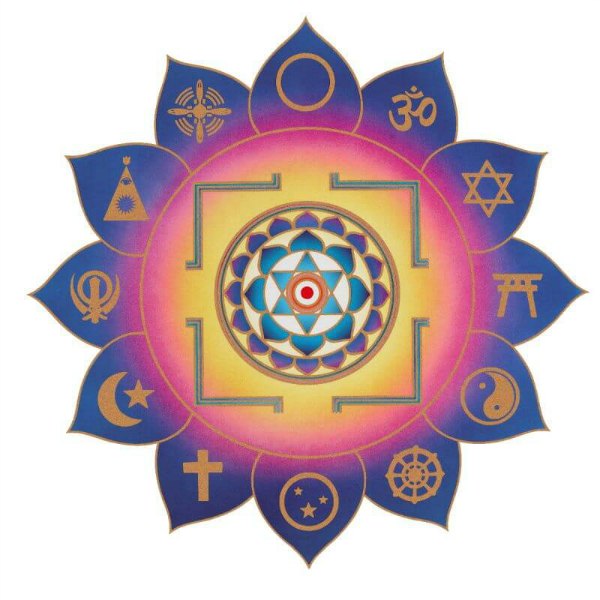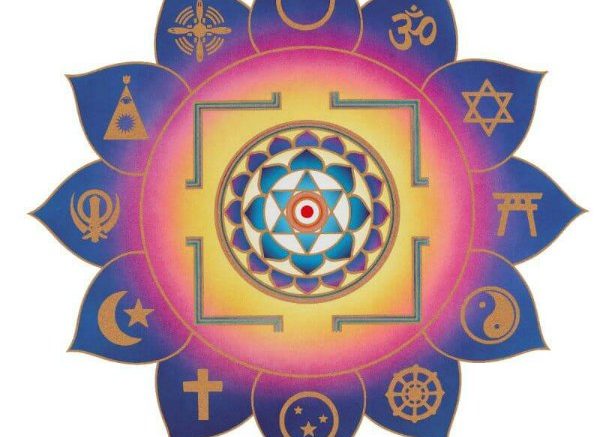 Article 7 in a Series (see full lnterfaith list here)
Article 7 in a Series (see full lnterfaith list here)
By Dan Wolf
Articles 2 and 6 explored some significant differences between God and Allah. This article examines one implication of those differences. Truth. Will. Not so much what it is or is not, but rather is it timeless and changeless or does it change with time? And if the latter, what are some implications of the difference?
God’s Will
The Bible is clear that God’s will, His Word and promises do not change. They were spoken once before time for all time. We have the following passages from the Bible supporting this idea.
God is not a man, that He should lie, Nor a son of man, that He should repent; Has He said, and will He not do it? Or has He spoken, and will He not make it good? Numbers 23:19[1]
Every good thing given and every perfect gift is from above, coming down from the Father of lights, with whom there is no variation or shifting shadow. James 1:17
Remember those who led you, who spoke the word of God to you; and considering the result of their conduct, imitate their faith. Jesus Christ is the same yesterday and today and forever. Hebrews 13:7-8
The New Testament documents the fruition of the Old Testament prophesies. In Christ’s words, “Do not think that I came to abolish the Law or the Prophets; I did not come to abolish but to fulfill.” Matthew 5:17
There is no reason for God’s Word, His Truth, or His will to change. By His foreknowledge he knew all of the good and bad decisions we each would make since before the beginning of time. With that foreknowledge He turned even our bad decisions to His good. That is God’s Divine Providence. As a result, man has free will within God’s perfect plan.
Allah’s Will
So what does Islam have to say about Allah’s will and truth? From Islam Is … “The Prophets, from Adam to Muhammad, were all brothers in faith. They all called people to the same truth. Different Messengers came with different sets of laws sent to God to guide and govern the people, but the essence of their teachings was the same.”[2] We saw above that God’s truth, and will, do not change. They are one. Pete Seda’s statement indicates that idea also holds true within Islam.
However, Allah is pure will; without Being, Essence, or Nature. This will provides unity as it holds absolute control over every aspect of creation. Within Islam Allah is the cause of all actions, but these actions are not a part of Allah’s Nature—as Allah is pure will. This will is absolutely inscrutable. Therefore, man cannot have a personal relationship with God, he can only obey. This is Christianity’s opposite, as man is made in God’s image and is intended to have a personal relationship with Him. It is through that relationship that we are transformed and accomplish our purpose.
Implications
Several Important implications arise from the above differences.
Abrogation
While God’s will does not change, Allah’s will does. Below are two contradictory passages from the Qur’an.
Theirs are good tidings in the life of the world and in the Hereafter – There is no changing the Words of Allah – that is the Supreme Triumph. (S10.64)[3]
Nothing of our revelation (even a single verse) do we abrogate or cause be forgotten, but we bring (in place) one better or the like thereof. Knowest thou not that Allah is Able to do all things? (S2.106)
This difference presents an inconsistency within Islam in regards to Allah’s will. Allah’s word does not change over time, but Allah’s will does. Allah’s revelations therefore are revealed over time and have changed over time. Such changes are difficult to square with the Qur’an’s stated consistency. Also, how can Allah be all-knowing if these abrogations represent corrections?
Predestination/Free Will
One can find verses supporting both free will and predestination within the Qur’an. However, the general view within Islam supports predestination. But, from Islam Is … again,
An important aspect of Islam is that every human being has the free will to choose between right and wrong. …
Human free will does not in any way contradict God’s absolute sovereignty over everything in creation. Neither does it contradict the fact that nothing happens in creation except what God wills. Some might say, “Therefore, I have no free will. My free will is but an illusion.” On the contrary, God created within each of us the ability to formulate an intention. God wants us to be able to make our own choices. When a person makes a choice, God, by His divine will, creates the actions and circumstances that allow the person’s intention to be carried out. It is God’s will that human beings have free will. God is not always pleased with the decisions people make, but He wants them to be able to make these decisions by their own free choice. An example of this is a person’s will to do a good deed. If the good deed comes to pass, God’s will allowed it to take place, and God will reward both the intention and action. In other words, God, The Judge, may reward you for good deeds willed but not yet carried out; however, He does not punish people for bad intentions not acted upon.[4]
While the above is a long passage, it brings out a critical difference between Christianity and Islam. The difference is in this. Within Christianity God made man with a free will which was good. It is man’s turning away from God’s will that results in an evil will.[5] Within Islam Allah’s will is responsible for all things, regardless of whether a thing is good or evil.
This notion is supported by one of the most respected Islamic theologians of all time, Al-Ghazali;
He [Allah] willeth also the unbelief of the unbeliever and the irreligion of the wicked and, without that will, there would neither be unbelief nor irreligion. All we do we do by His will: what He willeth not does not come to pass. If one should ask why God does not will that men should believe, we answer, “We have no right to enquire about what God wills or does. He is perfectly free to will and to do what He pleases.”[6]
Intentions versus Actions
As noted above, intentions also assume a place within Islam that they do not hold within Christianity. As Allah wills all things, whether something comes to pass or not depends upon that will. Actions occurring are dependent on Allah’s will. Within the Middle East, if you speak to someone about an event in the future (such as a meeting), you may hear the phrase ‘If Allah wills.’ They may or may not arrive at the event, and if they do not appear it is because Allah willed something else. Compare this notion to Christ’s words.
You have heard that the ancients were told, ‘You shall not commit murder’ and ‘Whoever commits murder shall be liable to the court.’ But I say to you that everyone who is angry with his brother shall be guilty before the court. Matthew 5:21-2
Therefore everyone who hears these words of Mine and acts on them, may be compared to a wise man who built his house on the rock. And the rain fell, and the floods came, and the winds blew and slammed against that house; and yet it did not fall, for it had been founded on the rock. Everyone who hears these words of Mine and does not act on them, will be like a foolish man who built his house on the sand. The rain fell, and the floods came, and the winds blew and slammed against that house; and it fell—and great was its fall. Matthew 7:24-7
Within Christianity bad intentions are enough to condemn one, good intentions must be acted upon—whether they succeed or not. As all is willed by Allah, Islam presents a very fatalistic view of life, one without the hope offered by Christianity. From the Qur’an,
And if We had so willed, We could have given every soul its guidance, but the word from Me concerning evildoers took effect: that I will fill Hell with the jinn and mankind together. (S 32.13)
Naught of disaster befalleth in the earth or in yourselves but it is in a Book before we bring it into being – Lo! that is easy for Allah. (S57.22)
Salvation
Within Islam the notion of original sin is rejected. Adam and Ever were forgiven for their transgression after they repented. Instead, each person is judged on the basis of their works.
Lo! As for those who believe and do good works, for them is a reward enduring. (S41.8)
Then, as for him whose scales are heavy (with good works), he will live a pleasant life. But as for him whose scales are light, the Bereft and Hungry One will be his mother (Hell). (S101.6-9)
One of the most frequently asked question when teaching about Islam goes along the lines of ‘Why would someone want to convert to Islam?’ I think that the above notion about salvation is a key part of the answer. Christianity requires a positive commitment to personal transformation. For many people, this is very difficult to do. It requires effort and commitment on our part. Christian principles are fairly easy to understand, but at times very difficult to live out.
We live in an increasingly secular country. Islam offers an ideology with a religious component that doesn’t require transformation—it only requires you to not disbelieve and submit. Couple this with salvation by works. If one views one’s self as good/moral already, a powerful alternative vision for addressing one’s spiritual needs without change is offered. However, it is a false promise.[7]
One final implication, and it concerns justice. Man is finite. His disobedience against God is rebellion, and the closest he can come to a capital crime against God. It requires a penalty—it requires punishment. Christ’s innocence and sacrifice on the cross paid that debt one time for all. That is justice. Islam cannot square up salvation with justice as there is no payment for man’s disobedience.
Dan Wolf is a researcher, analyst, and author. He has written three books examining the relationship between faith, freedom, virtue, and charity. Together these form the cornerstone of our purpose, and our society’s foundational principles derived from those relationships. Links to his work can be found at the Living Rightly website.
[1] All Bible references are from the New American Standard Bible, unless otherwise noted.
[2] Seda, Pete, Islam Is …, p. 5, 2002.
[3] All Qur’an verses are from Pickthall, M. M., The Meaning of the Glorious Qur’an, amana publishing, 1999.
[4] Seda, Pete, Islam Is …, p. 5-6, 2002.
[5] Schaff, Philip, Nicene and Post-Nicene Fathers, Vol. 2, Augustin: City of God, Christian Doctrine, pp. 502-3, Wm. B. Eerdman Publishing Company, 1989. Book XIV, Chapter 11. The full quote is, Accordingly God, as it is written, made man upright, and consequently with a good will. For if he had not had a good will, he could not have been upright. The good will, then, is the work of God; for God created him with it. But the first evil will, which preceded all man’s evil acts, was rather a kind of falling away from the work of God to its own works than any positive work. And therefore the acts resulting were evil, not having God, but the will itself for their end; so that the will or the man himself, so far as his will is bad, was as it were the evil tree bringing forth evil fruit.
[6] Abdul-Haqq, Abdiyah, Sharing Your Faith with a Muslim, p. 152, Bethany Fellowship, Inc., 1980. As cited in Geisler, Norman L. and Saleeb, Abdul, Answering Islam, p.32, Baker Books, 2008.
[7] Wolf, Dan, A War For God, p. 129-30, living rightly publications, 2017.





